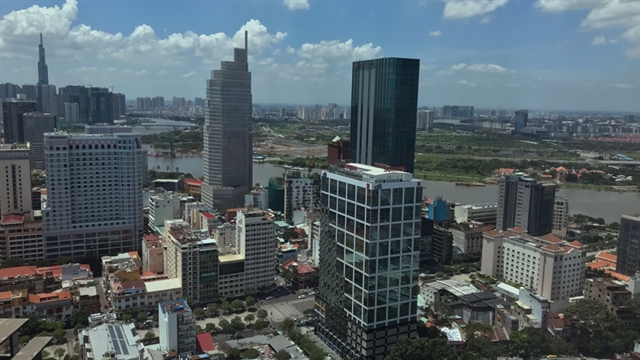The country’s real estate prices has still been increased rapidly despite the difficulties caused by the COVID-19 pandemic in the past two years, which reduced the income of the majority of the population, experts said.

Viet Nam's real estate prices have increased rapidly in the past two years despite the difficulties caused by the COVID-19 pandemic, which reduced the incomes of the majority of the population, experts have said.
The Ministry of Construction released a report in the second quarter of the year, saying that there was no new property inventory in the primary market.
In the April-June period, the total number of transactions in the real estate market was 29,949, an increase of 18 per cent from the first quarter of the year. There were 29,557 houses eligible to be sold while the supply of tourism-related real estate decreased.
The ministry’s statistics showed that the absorption capacity of the market in the second quarter was better. The estate inventory was almost exclusively available to secondary investors.
In Ha Noi, there were 1,094 successful transactions, equivalent to 20 per cent of the previous quarter. In HCM City, about 3,002 transactions were implemented, equivalent to 87 per cent of the previous quarter. In terms of the region, the north had 6,386 successful transactions while those in the central and southern regions were 7,300 and 16,265 respectively. The successful transactions were mainly in the middle and high-end segments.
The ministry reaffirmed that the housing market is still stable. The transaction prices in most localities tended to have increased slightly over the same period last year. The housing supply was still concentrated mainly in the mid-end and high-end segments while that of social and low-priced housing remains limited.
The prices of apartments in Ha Noi and HCM City increased by 5 – 7 per cent compared to the previous period. In the urban areas, there were almost no apartments with prices below VND25 million per square metre. The supply of this type of apartment is increasingly limited while demand is still high, this is leading to price increases.
Currently, mid-end apartments are still the dominant product in the market and accounted for the majority of the new supply in the second quarter of the year. The transaction price of mid-end apartments also increased in some areas such as Hai Ba Trung, Thanh Xuan, Hoang Mai (Ha Noi); District 5, Thu Duc (HCM City); and Di An (Binh Duong).
Notably, in Ha Noi and HCM City, a number of high-end apartment projects located in special and central locations have very high selling prices. The Grand Hang Bai project, located in the "golden land" of the capital city, has prices from VND570-700 million per square metre. In HCM City, projects such as One Central Saigon, District 1 are expected to have a record high selling price at VND650 - 800 million per square metre.
The rental price of apartments still tends to be decreasing quarterly compared to the end of 2020. The average decrease of the whole market was about 3-5 per cent.
Another report on the property market in Ha Noi in the first half of the year from Savills showed that the highest increase in estate prices was in the low-rise segment, followed by apartments. Specifically, the average price of villa and terrace houses increased in the second quarter of the year with 15 per cent and 32 per cent hikes respectively, in Hoang Mai District. Hoai Duc District took second place with a 29 per cent increase for villas and a 38 per cent increase for terrace houses. The average selling price in the apartment segment in the capital also reached $1,625 per square metre, representing an 11 per cent year-on-year increase.
Nguyen Van Dinh, General Secretary of the Viet Nam Real Estate Brokers Association, said that the money pouring into the real estate market is very big, but the scarcity of housing was the main reason for the price hike.The phenomenon of high demand and low supply and sharp price increases has made the dream of settling down for the majority of people much more difficult to achieve.
In the past two years, the real estate market has faced a serious supply shortage. The main reason was due to the limited land for housing developments in large urban areas, the high cost of land and the prolonged project licensing period. In particular, the lengthy inspections and legal checks of licensed projects made new supply tight. This is also a factor that causes housing prices in many provinces to increase. — VNS





